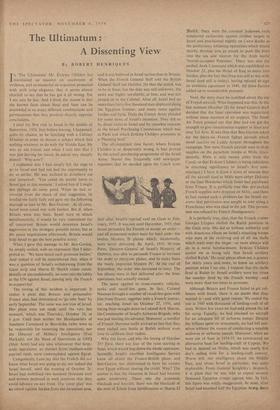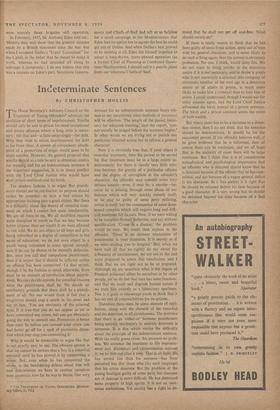The Ultimatum : A Dissenting View
By ROBERT HENRIQUES
TN`The Ultimatum' Mr. Erskine Childers has
marshalled so massive an assortment of evidence, and so masterful an argument presented with such crisp elegance, that it seems almost churlish to say that he has got it all wrong. Yet I am sure he has. And I think the reason is that the known facts about Sinai and Suez can be assembled in so many different combinations and permutations that they produce directly opposite conclusions.
I paid my first visit to Israel in the middle of September, 1956. Just before leaving, I happened, quite by chance, to be lunching with a Cabinet Minister in order to discuss a subject which had nothing whatever to do with the Middle East. He was an old friend, and when I told him that I was just leaving for Israel, he asked very sharply indeed : 'Why nmv?'
I explained that 1 had simply felt the urge to go to Israel and had not had the opportunity to do so earlier. He was inclined to disbelieve me and remarked : 'You could do untold harm in Israel just at this moment.' I asked him if 1 might not perhaps do some good. When he had re- covered from the shock of that suggestion, he briefed me fairly fully and gave me the following message to take to Mr. Ben-Gurion : At all costs, Israel must avoid war with Jordan. But if, when Britain went into Suez, Israel were to attack simultaneously. it would be very convenient for all concerned. Britain would denounce Israel's aggression in the strongest possible terms; but at the peace negotiations afterwards, Britain would help Israel to get the best possible treaty.
When I gave this message to Mr. Ben-Gurion, he simply smiled, with an expression that I inter- preted as : 'We have heard such promises before.' And indeed it will be remembered that, when it was a question of Israel's withdrawing from the Gaza strip and Sharm El Sheikh either condi- tionally or unconditionally, we went into the lobby at the UN against Israel, leaving only the French to support her.
The timing of this incident is important. It makes it plain that Britain, and presumably France also, had determined to 'go into Suez' by early September. The same was not true of Israel. Her plans were not made until the very last moment, which was Thursday, October 24, at 6 p.m. Until then neither the Headquarters of Southern Command at Beersheba (who were to be responsible for mounting the operation), nor the Director of Military Intelligence (Fati Harkabi), nor the Head of Operations at GHQ (Meir Amit) had any idea whatsoever that large- scale operations, as distinct from medium-scale reprisal raids, were contemplated against Egypt.
Categorically I can say that the French did not know what Israel was going to do, nor indeed did Israel herself, until the evening of October 26. Israel had mobilised two hundred thousand men and women deployed in such positions that they could advance on any front. The 'cover plan'. was an attack against Jordan from the Jerusalem area,
and it was believed in Israel no less than in Britain. When the French General Staff told the British General Staff (on October 26) that the attack was to be in Sinai, but the date was still unknown, the news was highly unreliable, at best, and was not passed on to the Cabinet. After all, Israel had no more than forty-live thousand men deployed along the Egyptian frontier, and many more against Jordan and Syria. Daily the French Army pleaded for some news of Israel's intention. They did so by direct radio to Israel and by ceaseless requests to the Israeli Purchasing Commission which was in Paris and which Erskine Childers promotes to a 'Planning Staff.'
The all-important time factor, where Erskine Childers is so desperately wrong, is best proved by the actual purchasing programme of the Israel Army. Nasser has frequently told newspaper reporters that he decided upon the Czech arms
deal after Israel's reprisal raid on Gaza in Feb- ruary, 1955. It was not until December, 1955, that Israel persuaded the French to accept an order— and all armament orders were for hard cash—for twelve Mystere II planes which, incidentally, were never delivered. By April, 1956, Sh'inon Peres, Director-General of Israel's Ministry of Defence, was able to persuade France to increase the order to thirty-six planes, and to make them the vastly improved Mystere ,IV. At the end of September, the order was increased to sixty. The last planes were in fact delivered after the Sinai operations had actually started.
The same applied to cross-country vehicles, tanks and recoil-less guns. In fact, Colonel Neeman brought a number of recoil-less guns with him from France. together with a French instruc- tor, reaching Israel on October 27, 1956, and taking them straight down to Colonel Arik Sharon, the Commander of Israel's Airborne Brigade, who was just starting his advance. Moreover, a number of French Sherman tanks arrived so late that they were rushed into battle at Rafah without even time to calibrate their radios.
Why this haste, and why the timing of October 29? First, there was fear of the rains starting in Sinai, which would bog down the whole operation. Secondly, Israel's excellent Intelligence Service knew all about the Franco-British plans, and Ben-Gurion was determined to have his victory over Egypt without sharing the credit. Why? The answer is that the situation in Israel had become quite intolerable. There was the economic blockade and boycott; there was the blockade of the port of Eilath from fortifications at Sharm El
Sheikh; there were the constant fedayeen raids conducted exclusively against civilian targets in Israel and proclaimed nightly on Cairo Radio as the preliminary softening operations which would shortly develop into an attack to push the Jews into the sea and recover for the Arab world `Jewish-occupied Palestine.' There was also the unified Arab Command which was established on October 24, plus the threat of Iraq to move into Jordan, plus the fact that Iraq was still at war with Israel (and still is today), having refused to sign an armistice agreement in 1949. All these factors added up to unendurable pressure.
Next, the story must he scotched about the use of French aircraft. What happened was this. At the last moment (October 28) the Israel General Staff decided that the Sinai operation was impractical without some measure of air support. The Israel Air Force pointed out that they had not got the strength to give simultaneous support in Sinai and over Tel Aviv. It was then that Ben-Gurion asked for the thirty-six French fighter aircraft which stood inactive on Lydda Airport throughout the campaign. Nor were French aircraft used to drop supplies on the parachute troops at Mitla. (Inci- dentally, Mitla is only twenty miles from the Canal, so that Erskine Childers is being ridiculous in attaching significance to Israel's first com- muniqu6.) I have it from a score of sources that all the aircraft used at Mitla were either Dakotas or the four Nordatlas which Israel had purchased from France. It is perfectly true that pre-packed French supplies were dropped on Mitla; and these in fact caused such a problem for- the Israeli air- crews that permission was sought to take along a Frenchman who was used to the job. This permis- sion was refused by French Headquarters.
It is perfectly true, also, that the French cruiser Georges Ldygues shelled the Rafah positions in the Gaza strip. She did so without authority and with disastrous effects on Israel's attacking troops who were at the receiving end of all the shells which went over the target—as most always will do in a naval bombardment. Erskine Childers quotes me as being told 'that Israeli artillery shelled Rafah.' He must please allow me, a gunner for thirty years and more, to know an artillery position when I see one. I suppose that the shells fired at Rafah by -Israeli artillery were ten times the number tired by the French warship--and were more than ten times as accurate.
Although Britain and France failed to get col- lusion with Israel, there is no doubt that they wanted it--and with good reason. We ended the war in 1945 with thousands of landing-craft of all sorts. Within five years we had sold almost the lot for scrap. Equally, we had retained no aircraft for an adequate lift of airborne troops. Despite the billions spent on armaments, we had left our- selves without the means of conducting a sizeable seaborne or airborne assault. Moreover, when we went out of Suez in 1954-55, we constructed no alternative base for landing-craft in Cyprus. We had to depend on Malta, which was nearly five day's sailing time for a landing-craft convoy. Worse still, our intelligence about the Middle East, and about Israel in particular, was quite deplorable. From General Keightley's despatch, it is plain that he was told to expect severity thousand Egyptian troops against him. In fact, this figure was wildly exaggerated. At most, after Israel had smashed half the Egyptian Army, there
were scarcely three brigades still operative.
In February, 1957, Sir Anthony Eden told me : `History may well show that the greatest mistake made by a British statesman since the war was when 1 accepted Dulles's "Users' Committee" for the Canal, in the belief that he meant to make it work, whereas he had intended all along to sabotage it completely.' I do not believe that this was a mistake on Eden's part. Successive Govern- ments and Chiefs-of-Staff had left us so helpless for a small campaign in the Mediterranean that Eden had no option but to accept the best he could get out of Dulles. And when Dulles's best proved to be nothing at all, Eden felt himself impelled to adopt a long-drawn, many-phased operation (as a former Chief of Planning at Combined Opera- tions Headquarters, I should call it a puerile plan) from our timorous Chiefs-of-Staff.







































 Previous page
Previous page